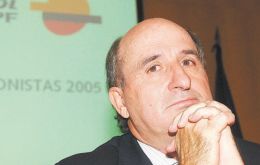MercoPress. South Atlantic News Agency
Tag: Repsol YPF, S.A.
-
Tuesday, April 17th 2012 - 03:03 UTC
YPF takeover: “Dreadful decision for Spain, for Argentina and terrible for legal security”

The Spanish government condemned Argentina’s announcement over the expropriation of YPF, calling it a “discriminatory” and “arbitrary” decision, and stated that it will adopt any measures deemed necessary to defend the interests of Repsol and every other Spanish company.
-
Friday, April 13th 2012 - 07:24 UTC
“Public interest” draft bill taking over 50.01% of YPF in Argentine congress

Argentine president Cristina Fernandez has sent a draft bill to her lawmakers in Congress that would allow the government to take a controlling stake in local oil and gas giant, YPF SA at the expense of its two largest shareholders, newspaper Clarin reported Thursday.
-
Thursday, April 12th 2012 - 17:08 UTC
Spain warns Argentina that any hostile action “will bring consequences”

Amidst the cross-fire between the Argentine government and Repsol-YPF oil giant, Spain’s Industry, Energy and Tourism Minister José Manuel Soria, warned on Thursday that “any sign of hostility” against Spanish companies “will be considered as a hostile sign against Spain and its government, and will bring consequences.”
-
Thursday, April 12th 2012 - 00:56 UTC
'K' Day for the future of YPF; shares in Buenos Aires and New York plunge

Shares in Argentina's biggest energy company YPF plunged 5.6% in Buenos Aires on Wednesday while the company's US-listed shares were 5% lower in New York.
-
Wednesday, April 11th 2012 - 06:35 UTC
A possible Chinese exit for the ongoing clashes between Repsol YPF and Argentina

China National Offshore Oil Corporation, CNOOC, could prove to be the solution for the ongoing clash between the Argentine government and Spain’s Repsol which holds a majority stake in YPG, Argentina’s main oil and gas company.
-
Tuesday, April 10th 2012 - 05:40 UTC
Repsol CEO in Argentina trying to prevent YPF takeover by the government

Repsol's chairman Antonio Brufau has asked for a meeting with officials from the Argentine government, which investors fear could seize control of the Spanish oil major's unit in Argentina, YPF.
-
Thursday, April 5th 2012 - 15:41 UTC
Argentina denies plan to acquire stake in YPF but provinces continue to rescind concessions

Argentina’s Planning Minister Julio de Vido denied a report by Buenos Aires newspaper Clarin that the government is working on a plan to use state-controlled pensions Anses to buy a stake in oil corporation YPF, he said in a statement.
-
Wednesday, April 4th 2012 - 01:47 UTC
YPF shares plummet on growing investors’ fear of Argentine government takeover

Shares in Argentina's biggest energy company, YPF plummeted on Tuesday because of growing investor fear over a possible government plan to seize control of the oil firm.
-
Sunday, April 1st 2012 - 08:49 UTC
Argentina has decided to take control of YPF, says pro-government newspaper

The Argentine government has made the decision to take control of leading energy company YPF and is discussing whether to renationalize it or intervene in its administration, a newspaper reported on Saturday.
-
Sunday, April 1st 2012 - 08:28 UTC
Rootyling for cash, the central bank has become Argentina’s Piggy bank

The Economist argues that with the latest legislation, the Argentine central bank has lost its legal independence and become the piggy bank of President Cristina Fernandez government.
